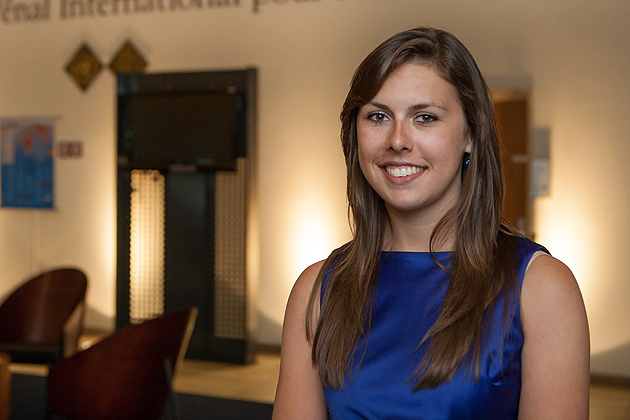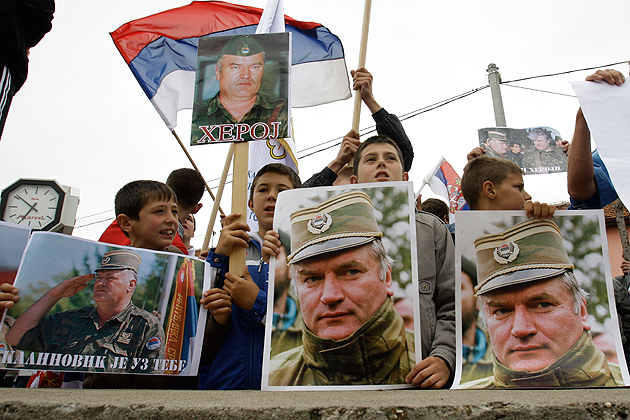
An alumna gets a firsthand look at international justice.
Never would I have imagined that my time at UConn would eventually afford me the opportunity to witness international justice unfold.
Yet during my senior year of college, UConn’s Human Rights Institute (HRI) awarded me the Goldstone Fellowship, providing me with a chance to complete a six-month internship in The Hague. There, I would serve in the Office of the Prosecutor at the International Criminal Tribunal for the former Yugoslavia (ICTY), involved in such projects as reviewing exculpatory evidence for the trial of former Bosnian Serb military commander Ratko Mladic, who is accused of war crimes including genocide against non-Serbs.
The HRI has played a large role in shaping my career interests and endeavors. I majored in English literature and political science, and minored in human rights. One of the first courses I took was Professor Shareen Hertel’s Comparative Perspectives on Human Rights, which fueled my curiosity about a subject area on which I have come to focus much of my time.
I then studied abroad through UConn’s Honors Program in Cape Town, South Africa. While there, I added to my human rights lexicon through coursework, as well as an internship at a local non-governmental organization. Working with Black Sash, which focuses on improving the socio-economic rights of the less fortunate, provided me with firsthand knowledge of the blatant human rights violations occurring within South Africa.
Studying abroad also gave me the chance to examine the United States through a different lens, allowing me to see that although the U.S. is well known for pointing out other countries’ human rights abuses, this country still has a very long way to go with regard to upholding the ideals of human rights.
Shortly after graduation, I headed to The Hague in July 2011 as an intern for the political analysis wing of the prosecution team. I gained a plethora of new knowledge and a much more intricate understanding of the genocide and ethnic conflict that plagued – and continues to plague – the Balkans.
My most prominent project dealt with the exculpatory evidence review for the Mladic trial. I examined more than 5,000 documents in order to determine and disclose exculpatory evidence to the defense counsel. This required extensive background knowledge of the indictment, atrocities, criminals, and events in the former Yugoslavia in the 1990s. Not only did this require me to be aware of this specific history, but the project also challenged me to analyze information from the defense’s mindset. In order to decipher what the defense might deem helpful to their case, I had to keep a very open mind as to what constitutes exculpatory evidence, and anticipate the various angles Mladic’s defense team might use in court.
The exposure to a vast array of different types of documents – from searing witness statements and confidential U.S. State Department reports to crucial correspondence between Mladic and other regional leaders – provided me with an exclusive understanding of the conflict. Throughout my six months as an intern, I kept a blog about all that I was learning at livingindenhaag.blogspot.com.
Following the end of my ICTY internship, I traveled for three weeks to Rwanda, where I participated in Global Youth Connect’s winter human rights delegation. There, I visited and spoke with Congolese people who live in a refugee camp, and volunteered with a local child soldiers non-governmental organization, as well as participated in a home-stay with a Rwandan family. I also visited several genocide memorials and sites, allowing me to come face-to-face with the realities of a post-conflict society.

As a result of my ICTY internship, I received a short-term contract, which has subsequently been extended. During my seven months working at the ICTY, I have continued many of my internship duties as well as delved into other projects in order to provide background prosecutorial support for the trial. Some of these additional assignments include assisting with edits to the pre-trial brief, locating proof of death documents for victims, and being appointed head reviewer on another disclosure project for the Mladic case.
This May, the prosecution made its opening statements in the Mladic case. It was very exciting to see the case in which I have been involved for nearly a year finally coming to fruition. Although the very first day of my internship – July 4, 2011 – was Mladic’s initial appearance in court, even more exhilarating was the first day of international media coverage this past May, when the beginning of the Mladic case was the top news story across the globe.
The ICTY work has given me the opportunity to watch several different trials’ court proceedings, and the fortune of sitting directly in the courtroom for a day. These invaluable occasions have provided me with insights into international legal procedures I would be hard-pressed to find elsewhere. My experiences interning and subsequently working at the ICTY have reaffirmed my passion to continue focusing on conflict and genocidal studies at the graduate level.
My time at UConn is something I will forever be thankful for, as my human rights minor, study abroad semester, and HRI fellowship have each given me priceless experiences. The college experience is all about what one is willing to put into it, and I for one can say I got everything and more out of my four years in Storrs.
I envy those students who are just beginning their careers at UConn, where a new human rights major was recently approved and where pioneering undergraduates graduated with this major as early as this May. Offering not only a minor in human rights, but also a major, will immensely benefit those who have interests similar to my own. Undergraduates at UConn will now have the opportunity to select from an even more robust selection of human rights coursework, taught by an ever-expanding and impressive array of recruited professors, at a university that is at the forefront of human rights education.
Katherine Bradbury ’11 (CLAS) will enroll this fall at the London School of Economics in a master’s program focused on conflict studies.



